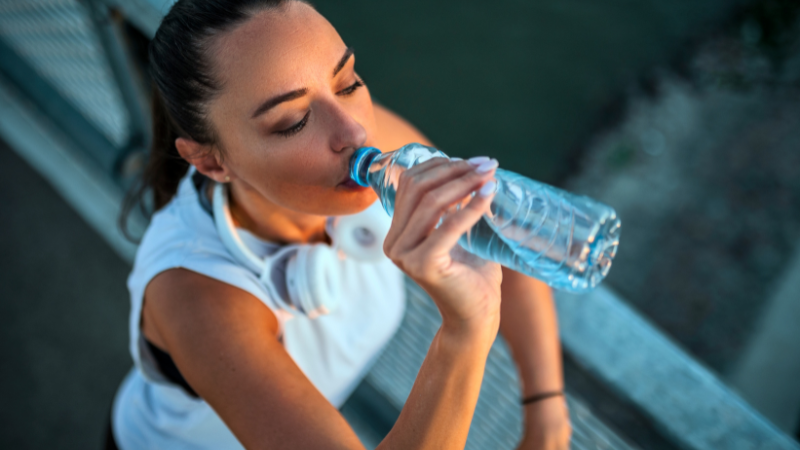Pickleball is a dynamic sport that demands agility, quick movements, and endurance. While the court may seem small, the intensity can quickly lead to dehydration, significantly impacting performance and overall well-being.
Why Hydration Matters
Water constitutes approximately 60% of the human body and serves as the medium for numerous vital processes.
- It facilitates thermoregulation, enabling the body to maintain a stable internal temperature through sweat production and evaporation.
- Water is essential for the transportation of nutrients and oxygen to cells, as well as the removal of metabolic waste products through the circulatory and excretory systems.
- Additionally, it maintains adequate blood volume, ensuring efficient blood flow and oxygen delivery to tissues. Hydration also plays a crucial role in maintaining cellular integrity, facilitating cellular signaling, and maintaining electrolyte balance, essential for proper muscle and nerve function.
How Dehydration Affects Performance
Even mild dehydration can have a noticeable impact on your pickleball game:
- Reduced Endurance: Dehydration decreases blood volume, making it harder for the heart to pump blood efficiently. This results in fatigue and reduced endurance, making it difficult to sustain the pace of the game.
- Impaired Mental Focus: When dehydrated, your brain function can suffer. This can lead to difficulty concentrating, slower reaction times, and decreased decision-making abilities – all crucial aspects of a successful pickleball match.
- Increased Risk of Injury: Dehydration can cause muscle cramps, dizziness, and fatigue, increasing the risk of injuries like sprains, strains, and falls.
The Importance of Water and Electrolytes
Water is the foundation of hydration. It replenishes fluids lost through sweat and maintains essential bodily functions. However, during intense physical activity, you also lose electrolytes, such as sodium, potassium, and magnesium.
Electrolytes are vital for muscle function, nerve transmission, and fluid balance. Replenishing electrolytes is crucial for preventing cramps, maintaining energy levels, and ensuring optimal performance.
Hydration Strategies
Before Play:
- Start hydrating the day before the game by increasing your water intake.
- Consume a balanced meal with plenty of fluids.
- Avoid excessive caffeine and alcohol, which can dehydrate you.
During Play:
- Bring a water bottle to the court and sip on it regularly throughout the game.
- Consider using sports drinks containing electrolytes to replenish mineral losses.
- Take short breaks to cool down and rehydrate between games.
After Play:
- Continue to hydrate after the game to replenish fluid losses.
- Consider consuming electrolyte-rich foods such as fruits, vegetables, and yogurt.
- Long-Term Benefits of Consistent Hydration
Maintaining consistent hydration habits beyond game days offers numerous long-term benefits:
- Improved Overall Health: Adequate hydration supports overall health by improving digestion, skin health, and kidney function.
- Reduced Cramp Risk: Regular hydration helps prevent muscle cramps, improving your quality of life both on and off the court.
- Enhanced Recovery: Proper hydration aids in muscle recovery, reducing soreness and allowing you to return to the court feeling refreshed.
KONA´s Tip: Don´t Forget the Water
Hydration is not just an afterthought; it's a cornerstone of peak pickleball performance. By prioritizing hydration before, during, and after play, you can enhance your endurance, sharpen your focus, reduce your risk of injury, and enjoy a more fulfilling pickleball experience. Make hydration a non-negotiable part of your game day routine and reap the rewards of a hydrated and healthy body.
Disclaimer: This information is for general knowledge and informational purposes only and does not constitute medical advice. Consult with a healthcare professional for personalized guidance on hydration and electrolyte needs.

